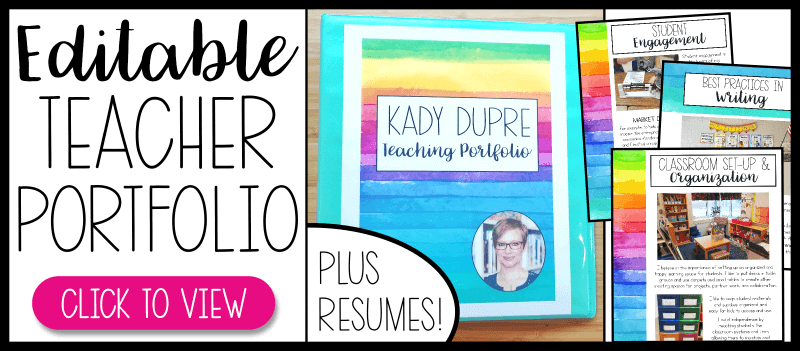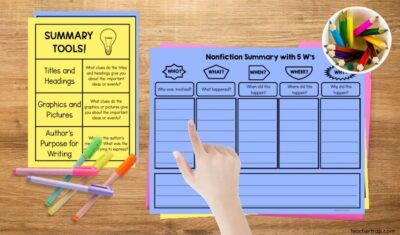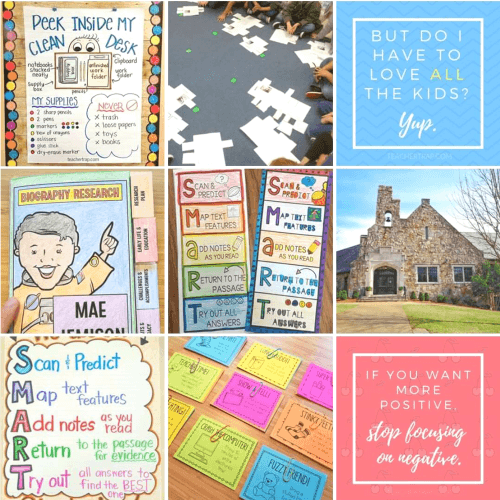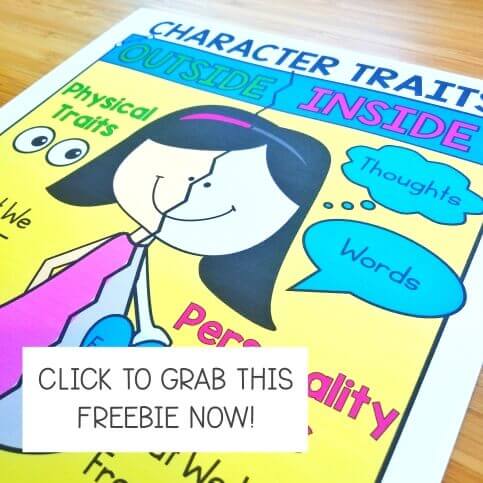Teacher interviews can be stressful! There are often multiple people on the other side of the table and you never know what questions might pop up. But with some easy planning, you can rock your next interview and snag your dream job!
I’ve served on too many teacher interview committees and I am here to share what works when you’re trying to land a teaching job. Here are my 5 top tips for nailing your teacher interview!

1. Research the School
Before any teacher interview, take the time to get to know a little bit about the school. What is the size and make-up of the student population? What communities does the school serve? What current initiatives are in place?
You can learn a lot by checking out a school (or district) website. For example, just from the school’s web page, you might discover they have a large ESL population or that the school has just launched a new STEM focus.
Make sure you’re familiar with whatever is going on at that school, because it’s likely they will ask you about your experience in those areas.
Knowing a bit about the school is also a great way to show that you are a proactive go-getter, and also that you are truly interested in being a part of what they do at that school.
2. Know Yourself as a Teacher
How would you describe yourself as a teacher? What do you believe about teaching and learning? What best practices do you use for each content-area? If you can’t easily answer those questions, you’ll want to take some time to think through who you are as a teacher.
When serving on an interview committee, it’s always concerning when a teacher gives you the “deer in headlights” look after being asked about their teaching philosophy or beliefs about teaching math, science, reading, etc.
I’ve also sat through many interviews where the candidate just doesn’t know how to talk about their practice. They ramble on, giving examples without ever getting to the point. You should be ready to quickly and succinctly sum up your teaching philosophy (in general terms, and as it relates to different subject-areas.)
PRO-TIP: Create a Teacher Portfolio
Creating a teacher portfolio is a great way to force yourself to think through your beliefs and practices. The final product also gives you a powerful way to demonstrate your skills in the classroom.
Not sure where to start? Check out my Editable Teacher Portfolio. Easily create a stand-out portfolio with ready-to-go guided template pages!
3. Think Through Practice Questions
Some teacher interview questions are downright tricky. It’s important to think through your answers to a variety of potential questions so that you feel confident and prepared.
Here are a list of common questions. If you can’t easily answer any of them, take the time to talk through or write down what you would say in response.
Tell us a little bit about yourself. Keep your answer short and sweet. Think about what traits or qualities you want to highlight in your answer. Generally, share where you’re from, a snippet about your family, a few hobbies, and something about why you love teaching. This lets them see your personality and form a personal connection.
PRO-TIP: Mention something that you are currently trying to learn to do or a goal you are working towards in your personal life!
What are your strengths as a teacher? Sometimes it’s hard for people to say good things about themselves, so be ready! What are your talents as a teacher? What makes you special? Think about things that the administration and other teachers on the team will value. Don’t go on and on about ways that you sacrifice time and money for students, but instead highlight your positive traits.
PRO-TIP: Focus on your commitment to meeting the needs of ALL students and your love of learning and perfecting your practice. Being positive and being a team-player are also great traits to highlight!
What are your weaknesses as a teacher? For goodness sake, do not share a real weakness! Admitting that you have trouble getting to school on time or that you hate writing lesson plans is not a great interview move (yes, I’ve heard this!). Think about weaknesses that are almost strengths, and be sure to include how you’re learning and growing to improve.
Examples:
I’m an over-planner so I’ve been working on streamlining my lesson planning process to make it more efficient.
Sometimes I get too focused on data. I’ve been reading (share a professional book you’re reading!) to help me think about how to use my data to get the best bang for the buck.
I really love my students and sometimes it’s hard not to worry about them. I’ve had to learn to reach out to the counselor or other teachers when I have a serious concern.
I love being involved in things at school, but sometimes I take on too much. I’ve been learning about setting healthy boundaries so I don’t over-extend myself and can stay energized and positive at school.
Make sure you show a good side of yourself through the lens of your “weakness” and include the proactive ways you are moving forward.
PRO-TIP: Think about something that you are working on improving and share how you’ve taken steps to improve that challenge through reading, professional development, or collaboration with other teachers.
I’m working on improving… (my guided reading lessons, using more cooperative learning, including more hands-on science investigations, building classroom community, etc.) by…
What do you do when a student isn’t making progress/reaching a goal? Demonstrate your proactive steps for ensuring success for all students. Talk about what you do to monitor growth and what you do to make sure all students are making progress. This question is about how YOU adjust your teaching methods to meet the needs of students, not about how you let students or parents know they are failing.
PRO-TIP: Talk about ways that you differentiate instruction and provide targeted small group support!
How do you form relationships with parents/communicate with parents? Let them see that you are proactive when it comes to working with and communicating with parents. Give a few specific examples and show your commitment to building solid relationships. ***Avoid complaining about parent support, which I’ve heard many teachers do.
PRO-TIP: Share how you’ll create a partnership to support student learning!
How do you manage student behavior? Describe your classroom management system. Most teachers talk about their behavior and reward system to answer this question. Instead, focus on the things you do to set up a well-run classroom and prevent behavior issues in the first place.
Talk about the routines and procedures you use to keep the classroom running smoothly and how you teach expectations. How do you build strong relationships with your students? What types of engagement strategies do you use to keep students interested and on task? How do you create a positive learning environment?
PRO-TIP: Mention ways that you include students in problem-solving classroom management issues. (Class meetings, problem-solving meetings, peer support, etc.)
What best practices do you use (what is your philosophy) in teaching math, science, reading, writing, balanced literacy, social studies, word study, vocabulary, etc.? Again, be ready to talk about your practice for each different content-area. Creating the teacher portfolio is a great way to do this, but at the very least talk through or write down your thoughts for each subject. Depending on the school, you might also think about how you would teach STEM, ESL students, technology integration, or other specifics.
PRO-TIP: Create a teacher portfolio packed with photos of you and your students engaged in meaningful learning for each content-area!
When was a time you faced a challenge (with parents, with a student, with a colleague)? How did you handle that challenge? This question is about seeing how you react when the going gets tough. Think of some examples before an interview. (DON’T say you can’t think of one! Everyone has faced some kind of challenge.) The idea is to pick an example that shows a difficult situation and how you thoughtfully or creatively worked toward a solution.
PRO-TIP: Choose an example that required you to collaborate with a teacher or parent. Show that you faced the challenge with positivity and determination.
4. Be Who You Want to Work With
Before you head into an interview, think about the type of people you enjoy working with. Get a vision of an ideal co-worker in your mind and then be that person when you walk into your interview. Unfortunately, some people are so nervous in interviews that they appear unfriendly, too intense (those fast-talkers!), or scattered. Channel your favorite co-worker! Show that you are friendly, reliable, level-headed, and organized. Show that you would be easy to get along with and are a team-player.
This is isn’t about being fake or pretending to be someone you’re not. It’s simply about putting your best foot forward and letting them see the best parts of you. Sometimes, this is hard to do when you feel like you’re under a microscope, so be thoughtful beforehand.
PRO-TIP: Show that you love what you do! Let some (calm) enthusiasm come through.
5. End Strong
Interview committees sometimes see multiple people in a row and it is exhausting! Candidates start to blend together and by the end , it’s hard to remember who was who. So make sure they’ll remember you!
Ask Some Questions
First, make sure you have a few great questions to ask them. Most interviews end with “Do you have any questions for us?” and most candidates just say, “No.” Not you! Think of a few questions that show you are truly interested in the job, and that you know your own value.
For example:
I’d love to hear what you love about your school.
What makes this school special?
What are the best things about working at this school?
What is your favorite thing about working at this school?
How would you describe the relationship between the administration and the teachers?
What words would you use to describe your school?
Make Eye Contact With Each Person
As the interview wraps up, don’t just fade out. Make a point to look each person in the eye and smile as you thank them for the chance to interview. Let them know how excited you are at the possibility of joining their team.
Thank you so much for this opportunity. It was wonderful to meet you all. I can tell this is a special place. I look forward to hearing from you soon.
I hope this post helps you feel confident and prepared for your next interview! Practicing with a friend or in the mirror are also great ways to get ready. Talking about yourself always seems so easy, until you have to do it in front of strangers!














